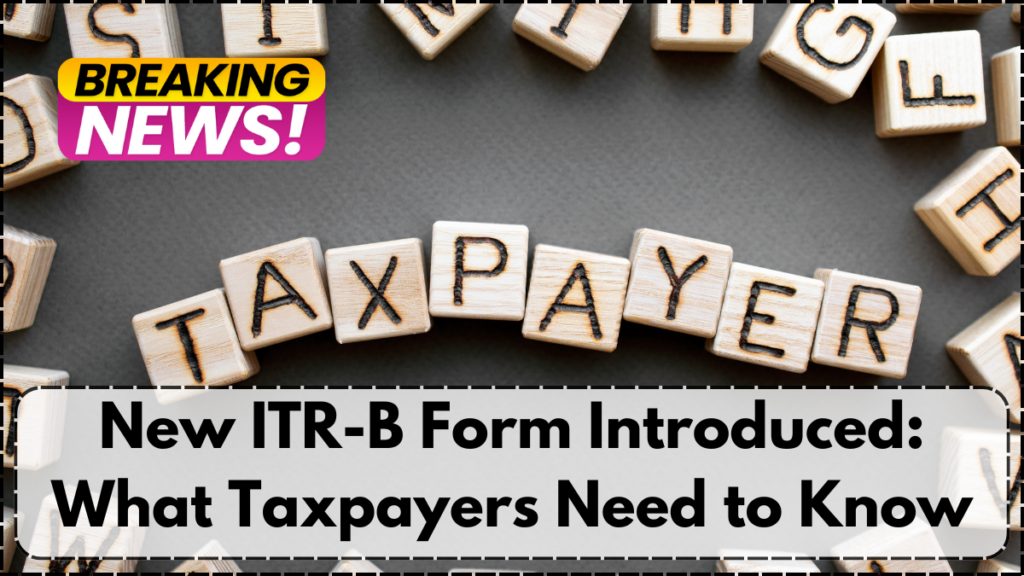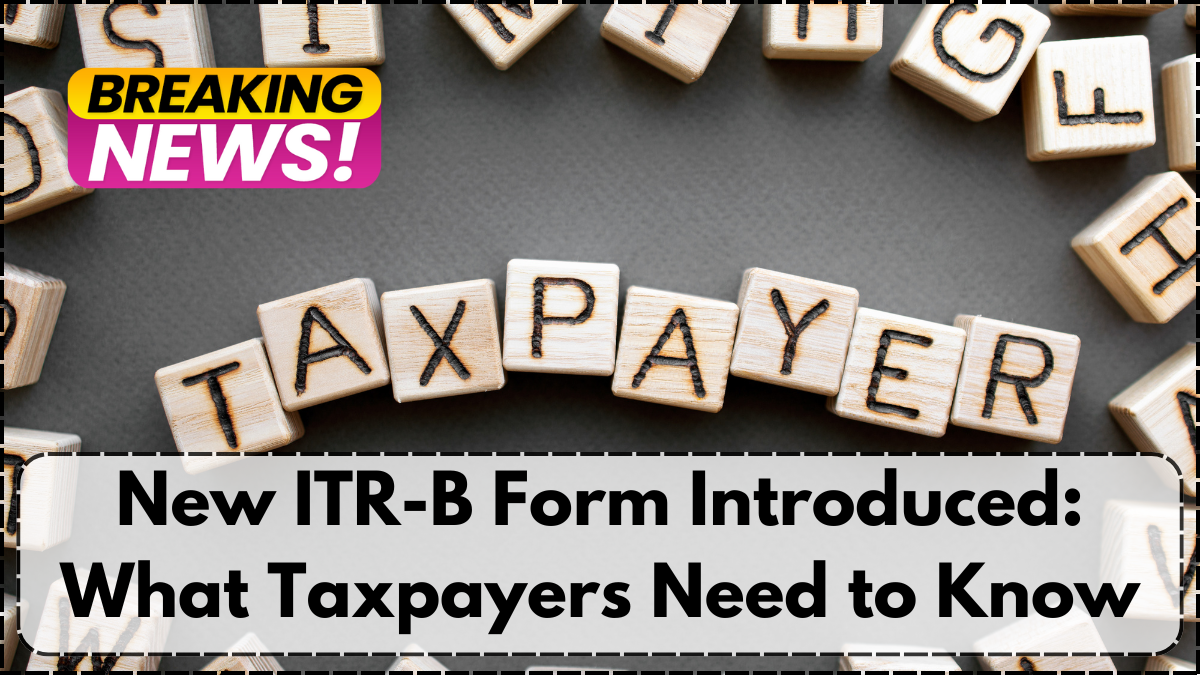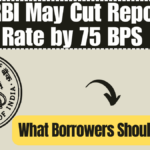In a decisive step to enhance tax transparency and tighten oversight on unreported income, the Income Tax Department has officially rolled out Form ITR-B—a specialized income tax return form. This form is now mandatory for individuals and entities subjected to search or requisition operations initiated on or after September 1, 2024.
The move represents a significant shift in India’s tax administration strategy, focusing directly on undisclosed income uncovered during enforcement actions under Sections 132 and 132A of the Income Tax Act.

What Is Form ITR-B?
Form ITR-B is a newly mandated return form specifically designed for taxpayers who have come under scrutiny through tax raids or requisition proceedings. Unlike the standard ITR forms (which typically cover a single financial year), ITR-B addresses “block assessment periods”—spanning multiple assessment years.
These periods reflect the suspected timeframe during which the taxpayer is believed to have concealed income or evaded taxes. The intent is to capture a full picture of undeclared wealth and bring it into the tax net in a structured, legally compliant manner.
Why Was Form ITR-B Introduced?
The introduction of Form ITR-B is rooted in the amendments to Chapter XIV-B of the Income Tax Act. This chapter governs search and seizure assessments. Previously, tax authorities would assess the total income, including both disclosed and undisclosed sources.
With the changes in place from late 2024, the emphasis has now shifted squarely toward undisclosed income, helping authorities identify and act specifically on tax evasion discovered during enforcement actions.
This aligns with broader national initiatives, such as:
-
Curtailing black money
-
Improving voluntary tax compliance
-
Strengthening legal tools against tax evaders
Who Is Required to File ITR-B?
The ITR-B form is not a general-purpose return. It applies exclusively to:
-
Any individual, company, HUF, partnership firm, or other entity subject to a search or requisition operation initiated on or after September 1, 2024.
-
Taxpayers who receive a notice under Section 158BC following such operations.
Filing Deadline for Form ITR-B
Taxpayers must submit Form ITR-B within 60 days from the date they receive the notice under Section 158BC. The countdown starts from the date the notice is served—not the date of the search—making prompt response crucial.
Missing this deadline could lead to:
-
Heavy penalties
-
Legal prosecution
-
Seizure of assets or freezing of accounts
Key Features of ITR-B (at a Glance)
| Feature | Details |
|---|---|
| Purpose | Reports undisclosed income found during tax search/requisition operations |
| Applicable From | September 1, 2024 |
| Assessment Basis | Block Assessment Period (Multiple years) |
| Target Taxpayers | Only those facing Section 132/132A actions |
| Filing Deadline | 60 days from receipt of Section 158BC notice |
| Scope | Not valid for regular return filings |
| Penalty for Non-Compliance | Legal action, monetary penalties, asset attachment |
Steps Taxpayers Must Take
If you’re impacted by a notice or operation under these provisions, here’s what you should do:
1. Understand the Notice
Carefully read the notice received under Section 158BC. It will outline the block assessment years, scope, and deadlines.
2. Compile Relevant Documentation
Gather records for assets such as cash, jewellery, property, or financial transactions not previously declared. This documentation is critical.
3. Declare Truthfully
Form ITR-B is specifically designed to capture previously undisclosed income. Misreporting or underreporting at this stage could trigger more severe scrutiny.
4. Seek Expert Help
Tax search cases are complex. Consult a chartered accountant or tax lawyer who specializes in search assessments.
5. Don’t Miss the Deadline
Ensure that your ITR-B is submitted within the 60-day timeframe. Late filing is viewed seriously under tax laws governing search assessments.
Why This Matters in 2025
With data integration across PAN, Aadhaar, bank records, and GST platforms, non-compliance is increasingly harder to hide. The introduction of Form ITR-B is a clear indication that tax enforcement in India is entering a more digitized and focused phase in 2025.
The government is not just tightening the screws on tax evasion—it is building a system where compliance is non-negotiable.
Conclusion
Form ITR-B is a pivotal development in India’s tax compliance framework. Introduced with effect from September 2024, this new form is not just procedural—it reflects the government’s serious stance against undisclosed wealth and its effort to bring greater transparency to the system. For those affected by search and requisition actions, understanding the implications of this form—and responding accurately and on time—is critical to staying compliant and avoiding severe legal consequences.
FAQs on Form ITR-B
What is a “block assessment period” in Form ITR-B?
A block assessment period refers to multiple years covered under a single assessment, typically used when undisclosed income is discovered during a search or requisition.
Can Form ITR-B be filed online?
As of April 2025, the Income Tax Department is expected to launch a dedicated online utility for Form ITR-B filings, integrated within the e-filing portal.
What if I fail to file Form ITR-B within 60 days?
Failure to file within the prescribed deadline can result in heavy penalties, interest, and even prosecution under the Income Tax Act.
Is Form ITR-B applicable to ongoing assessments before September 1, 2024?
No. The form is only applicable if the search or requisition action was initiated on or after September 1, 2024.
Do I still need to file a regular ITR after submitting Form ITR-B?
If you’re required to file a regular ITR for other disclosed income unrelated to the search, you may still need to do so—separately from ITR-B.
For More Information Click Here
Pari is a passionate writer known for captivating stories that blend imagination and reality. Inspired by travel, history, and everyday moments, Pari crafts narratives that resonate deeply with readers.




